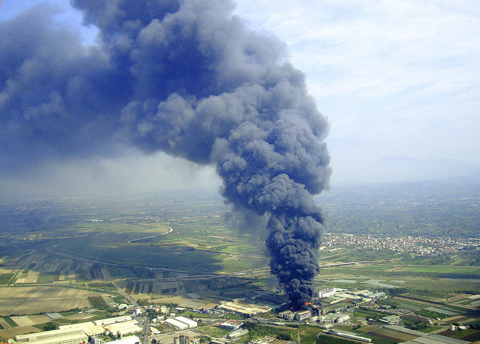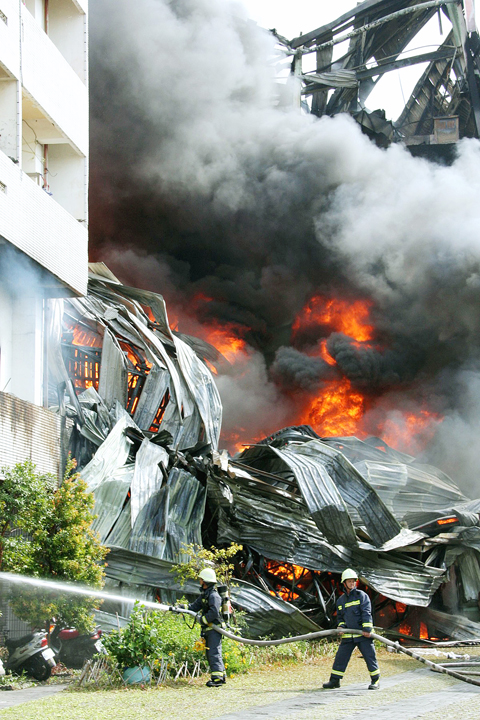A magnitude-6.4 earthquake struck southern Taiwan early yesterday morning, prompting staff evacuations at some production lines, which could cause disruptions in shipments of flat panels.
“Utility supplies were normal and there were no reports of casualties or damage, but production of some equipment was suspended temporarily,” the administration office of Southern Taiwan Science Park said in a statement yesterday.
“Following standard safety procedures, workers were immediately evacuated after the earthquake,” it said.

PHOTO: REUTERS/NATIONAL AIRBORNE SERVICE CORPS
The administration is in charge of Tainan Science Park and Kaohsiung Science Park — where 100-plus production lines, including solar cell maker Motech Industries Inc (茂迪), panel maker Chi Mei Optoelectronics Corp (奇美電子) and chipmaker Taiwan Semiconductor Manufacturing Co (TSMC, 台積電) — are located.
The intensity of the quake at Tainan Science Park was 5 on the Richter Scale, while that at Kaohsiung Science Park was 4, the statement said.
“Most of Chi Mei’s production lines have resumed operations,” Chi Mei spokesman Eddie Chen (陳彥松) said by telephone. “Some still need parts or adjustments and we’ll have to clean up the mess.”

PHOTO: CNA
AU Optronics Corp (友達光電), the nation’s largest manufacturer of liquid-crystal-display (LCD) panels, suffered “no significant impact” on its finances and operations, the company said in a stock exchange filing.
However, global LCD supply could be disrupted, Bank of America Merrill Lynch analyst Frank Lee said.
Nearly all of Chi Mei’s fabs were affected, although the severity remains unclear, Lee wrote in a note to clients, quoting initial company feedback.
“We could see a pretty significant disruption to the overall LCD supply chain” during the second and third quarters, he wrote.
Meanwhile in Tainan County, firefighters were called in when a fire started in an automated storage warehouse at an Everest Textiles plant in Shanshang Township (山上) following the quake.
United Microelectronics Corp (聯電), the world’s second-largest custom-chipmaker, suffered damage estimated at NT$55 million (US$1.7 million), as production equipment crashed and some tools sustained minor damage, chief financial officer Liu Chi-tung (劉啟東) told Central News Agency.
Production at its 12-inch factory at Tainan Science Park will be delayed by one day and its factory in Singapore will help meet shipment demand, he said.
TSMC estimated losses would be the equivalent of one-and-a-half days of production.
“Assessment reports show that the earthquake had a minimal impact at the Hsinchu fabs. While fabs in Tainan were more seriously affected, they have gradually resumed production,” the world’s largest custom-chip maker said in a statement on its Web site.
Motech Industries and E-Tone Solar Tech Co Ltd (益通光能) said the earthquake would not have a major impact on shipments.
As solar cell production is not as sophisticated as that for panels and chips, employee evacuations and equipment shutdown didn’t hurt as much, they said.

CHIP RACE: Three years of overbroad export controls drove foreign competitors to pursue their own AI chips, and ‘cost US taxpayers billions of dollars,’ Nvidia said China has figured out the US strategy for allowing it to buy Nvidia Corp’s H200s and is rejecting the artificial intelligence (AI) chip in favor of domestically developed semiconductors, White House AI adviser David Sacks said, citing news reports. US President Donald Trump on Monday said that he would allow shipments of Nvidia’s H200 chips to China, part of an administration effort backed by Sacks to challenge Chinese tech champions such as Huawei Technologies Co (華為) by bringing US competition to their home market. On Friday, Sacks signaled that he was uncertain about whether that approach would work. “They’re rejecting our chips,” Sacks

NATIONAL SECURITY: Intel’s testing of ACM tools despite US government control ‘highlights egregious gaps in US technology protection policies,’ a former official said Chipmaker Intel Corp has tested chipmaking tools this year from a toolmaker with deep roots in China and two overseas units that were targeted by US sanctions, according to two sources with direct knowledge of the matter. Intel, which fended off calls for its CEO’s resignation from US President Donald Trump in August over his alleged ties to China, got the tools from ACM Research Inc, a Fremont, California-based producer of chipmaking equipment. Two of ACM’s units, based in Shanghai and South Korea, were among a number of firms barred last year from receiving US technology over claims they have

It is challenging to build infrastructure in much of Europe. Constrained budgets and polarized politics tend to undermine long-term projects, forcing officials to react to emergencies rather than plan for the future. Not in Austria. Today, the country is to officially open its Koralmbahn tunnel, the 5.9 billion euro (US$6.9 billion) centerpiece of a groundbreaking new railway that will eventually run from Poland’s Baltic coast to the Adriatic Sea, transforming travel within Austria and positioning the Alpine nation at the forefront of logistics in Europe. “It is Austria’s biggest socio-economic experiment in over a century,” said Eric Kirschner, an economist at Graz-based Joanneum

OPTION: Uber said it could provide higher pay for batch trips, if incentives for batching is not removed entirely, as the latter would force it to pass on the costs to consumers Uber Technologies Inc yesterday warned that proposed restrictions on batching orders and minimum wages could prompt a NT$20 delivery fee increase in Taiwan, as lower efficiency would drive up costs. Uber CEO Dara Khosrowshahi made the remarks yesterday during his visit to Taiwan. He is on a multileg trip to the region, which includes stops in South Korea and Japan. His visit coincided the release last month of the Ministry of Labor’s draft bill on the delivery sector, which aims to safeguard delivery workers’ rights and improve their welfare. The ministry set the minimum pay for local food delivery drivers at